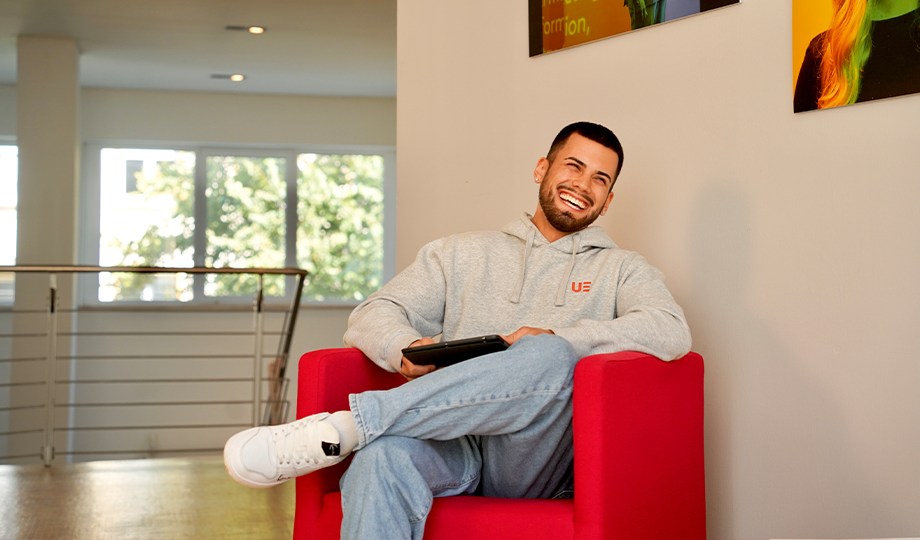
Planning a future in Germany, but not quite ready to tackle the grammar tables? Good news – at the University of Europe for Applied Sciences (UE), you can study a bachelor’s degree in Germany in English and still get the full experience. The academic challenge, the international community, the chance to live in one of Europe’s most exciting countries. It’s all there, just without the language barrier.

Why Choose Germany for Your Studies?
High-Quality Education: German universities are renowned for academic excellence and rigorous standards. UE offers practical, career-focused programmes with experienced faculty. You’ll graduate ready to make an impact.
Affordable Tuition: Universities in Germany are famously affordable, and UE’s private model offers value through small classes and hands-on learning. It’s an investment in your future without breaking the bank.
Rich Cultural Experience: From Berlin’s dynamic art scene to Hamburg’s maritime charm, Germany blends history with modernity. You’ll live and learn in a country that’s as inspiring as it is diverse.
Career Opportunities: Germany’s economy is a powerhouse, with companies like Siemens and Volkswagen seeking skilled graduates. A degree here opens doors to exciting career paths.
Germany combines academic rigour with a vibrant student life, making it an ideal place to study.

Finding Your Perfect Fit: How to Choose the Right Field
Look ahead too. Some degrees set you up for defined career paths: finance, UX design, clinical psychology. Others offer flexibility, opening doors in a range of industries. You don’t need to have it all figured out now, but think about where your interests meet real-world relevance.
Remember that universities like UE design their programmes with input from industry experts. This means that you won't just be studying theory, but also learning the tools, skills, and approaches that employers actually use.
Beyond the Lecture Theatre: How English-Taught Programmes Help Your Career Go Global
Choosing to study a bachelor’s in Germany in English is a practical step, especially if you want to get started right away. But it also opens doors, not just here, but internationally.
Studying in English puts you in classrooms with students from around the world. It keeps you competitive in global markets, especially in industries where English is the default language, like tech, marketing, research and international business. And although the degree is in English, many students pick up German over time anyway, through day-to-day life. No pressure, just practice.
What Makes UE’s English-Taught Programmes Stand Out
You’ll find English-taught bachelors in Germany at many institutions, but not all programmes are built the same. At UE, the focus is on more than just content. It’s about how you learn, who you learn from and where that learning takes you.
Courses are taught in small groups. You’ll get to know your lecturers. You’ll also have access to expert practitioners – people who work in the industries you’re studying for. Some programmes include live briefs, where you work on projects for actual companies. It’s hands-on, with room for reflection. And there’s a lot of support along the way.
What Can You Study?
UE offers a range of English-taught bachelor’s degree programmes in Germany across six broad subject areas. Each one combines classroom learning with real-world application:
- Art & Design
Explore everything from visual communication to illustration and game design. Build your portfolio as you go. - Business & Sport
Dive into marketing, management, finance or explore the sports industry through operations, branding and events. - Tech & Software
Focus on subjects like data science, coding or UX design. Courses are project-based, and industry-informed. - Health & Psychology
Study topics related to health management, leadership or psychology. Courses connect theory to practical work. - Dual Programmes
Spend part of your time working in a company, applying what you learn while gaining professional experience. - Foundation Year
Not quite ready to jump in? This one-year option helps you prepare, academically and personally.
Each programme is structured to give you a clear path forward, whether into work, further study or a more specialised field.
How to Nail Your Application: Step by Step
Ready to join UE and start an English-taught bachelor’s in Germany? Follow this roadmap:
- Verify Your Qualifications. Confirm your high school diploma meets German Abitur equivalence and provide proof of English proficiency (TOEFL, IELTS, CAE, Duolingo or other exam according to admission requirements).
- Compile Your Portfolio. For design or media tracks, assemble work samples; for business and tech, showcase projects or case studies.
- Craft a Compelling Motivation Letter. Outline your academic interests, career goals and how you’ll enrich UE’s community.
- Submit on Time. Winter semester deadlines typically fall in mid-July; summer semester by mid-January. Upload transcripts, certificates and recommendations via the UE portal.
- Prepare to Move. Once accepted, arrange your visa, explore student housing options and consider beginner German courses to ease your arrival.
Start Your Journey with UE
Choosing to study a bachelor’s degree in Germany in English at UE means investing in a world-class education and an unforgettable experience. You’ll gain new skills, meet people from around the world and immerse yourself in Germany’s vibrant culture. It’s a step towards a bright, global future.
Ready to take the leap? Explore UE’s English-taught bachelor’s programmes and find the one that’s right for you. Visit our programmes page to get started!